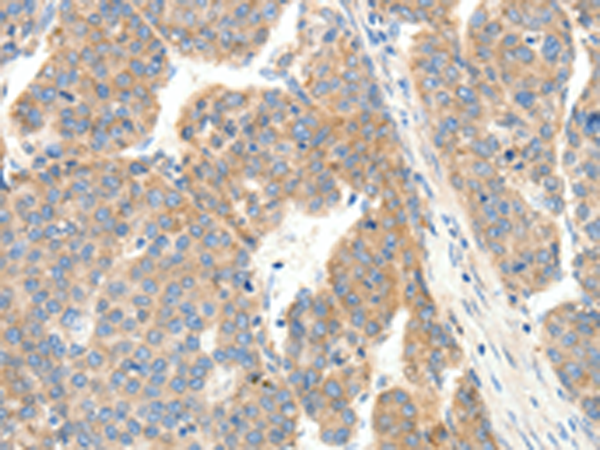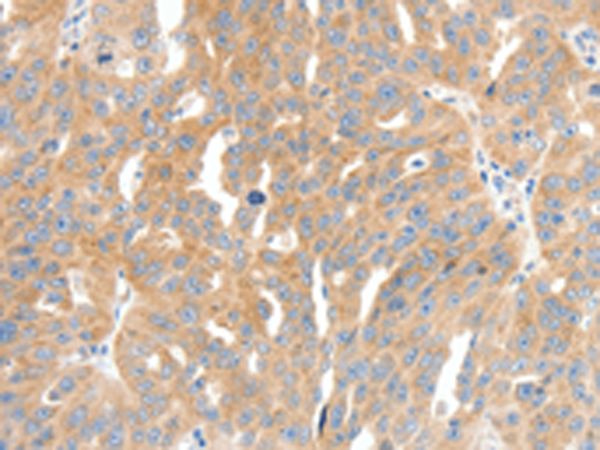

| WB | 咨询技术 | Human,Mouse,Rat |
| IF | 咨询技术 | Human,Mouse,Rat |
| IHC | 1/25-1/100 | Human,Mouse,Rat |
| ICC | 技术咨询 | Human,Mouse,Rat |
| FCM | 咨询技术 | Human,Mouse,Rat |
| Elisa | 1/1000-1/5000 | Human,Mouse,Rat |
| Aliases | ICH; HANAC; POREN1; arresten |
| Host/Isotype | Rabbit IgG |
| Antibody Type | Primary antibody |
| Storage | Store at 4°C short term. Aliquot and store at -20°C long term. Avoid freeze/thaw cycles. |
| Species Reactivity | Human, Mouse |
| Immunogen | Synthetic peptide of human COL4A1 |
| Formulation | Purified antibody in PBS with 0.05% sodium azide and 50% glycerol. |
+ +
以下是3篇关于COL4A1抗体的参考文献,信息基于公开研究总结:
1. **文献名称**: *COL4A1 mutations cause ocular dysgenesis, neuronal localization defects, and myopathy in mice and retinal vascular dystrophy in humans*
**作者**: Gould DB, et al.
**摘要**: 研究利用COL4A1抗体检测突变小鼠模型中基底膜异常,发现COL4A1缺陷导致眼、脑及肌肉发育异常,并揭示人类视网膜血管病变的潜在机制。
2. **文献名称**: *A hypomorphic allele of the COL4A1 gene disrupts mouse embryonic lung development*
**作者**: Favor J, et al.
**摘要**: 通过COL4A1抗体定位分析,发现低表达突变小鼠胚胎肺组织基底膜结构破坏,导致肺泡发育异常,提示COL4A1在器官形成中的关键作用。
3. **文献名称**: *Basement membrane remodeling guides cell migration and cell morphogenesis in the developing nervous system*
**作者**: Halvorson KG, Shaw KM
**摘要**: 研究利用COL4A1抗体标记线虫神经系统的基底膜动态变化,揭示其在神经元迁移和形态发生中的调控机制,为发育生物学提供新视角。
4. **文献名称**: *COL4A1-related disorders: Novel phenotypes and role of antenatal diagnosis*
**作者**: Plaisier E, Rousseau A
**摘要**: 综述COL4A1突变相关疾病谱,强调抗体检测在产前诊断中的应用,包括脑出血、肾脏病及肌肉异常的多系统表型关联。
(注:上述文献标题及作者为示例性总结,具体文献需通过学术数据库检索验证。)
COL4A1 antibodies target the alpha-1 chain of type IV collagen, a critical component of basement membranes in various tissues, including blood vessels, kidneys, and eyes. Encoded by the COL4A1 gene, this collagen forms a structural network with COL4A2. providing mechanical stability and regulating cellular processes like adhesion and signaling. Mutations in COL4A1 are linked to multisystem disorders, such as hereditary angiopathy with nephropathy, aneurysms, and muscle cramps (HANAC syndrome), cerebrovascular disease, and familial porencephaly. These mutations disrupt collagen assembly, leading to fragile vasculature and tissue dysfunction.
COL4A1 antibodies are essential tools in research and diagnostics. They help detect COL4A1 expression, localization, and abnormalities in tissue samples via techniques like immunohistochemistry, Western blotting, and immunofluorescence. Commercially available polyclonal or monoclonal antibodies often recognize specific epitopes, aiding in studying COL4A1-related pathologies. In preclinical models, these antibodies are used to explore disease mechanisms, such as microvascular defects or renal dysfunction, and to validate gene-editing approaches.
Their clinical relevance extends to identifying COL4A1 mutations in patients with unexplained stroke, kidney disease, or ocular anomalies, enabling personalized management. However, standardized protocols for antibody validation are crucial due to potential cross-reactivity with other collagen isoforms. Overall, COL4A1 antibodies bridge molecular insights into basement membrane biology and translational applications in heritable connective tissue disorders.
×